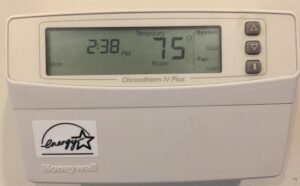By David Wilkening, Contributing Writer

REGION – Typical of many seniors, George Downie has an aging home. Heating and cooling bills―which typically make up the greatest share of energy costs for most households―were particularly disturbing. He asked for a home energy assessment. “We have an older home, and I knew it needed help,” he said. His major goal was a familiar one: save money. “I’m semi-retired and money is always an issue,” Downie explained.
Free energy usage assessment
A Mass Save energy specialist had various recommendations. They included some simple do-it-yourself types such as light fixture changes, low-flow showerheads and new thermostats. Another suggestion: adding insulation in drafty areas in his longtime West Springfield home.
“We’ve found through the years that many of our customers live in older homes that do not have insulation in the walls,” said Bill Stack, Eversource Energy efficiency spokesman. “Customers can see insulation in their attic and perhaps in their basement, but they don’t realize that they lose a significant amount of cooling in the summer and heating in the winter due to the lack of insulation.”
The result for Downie was a 30 percent savings in home energy costs. He was a satisfied customer of Mass Save. So much so that he became one of their case studies of statewide individuals who benefited from a program that offers free advice and other perks to cut down energy costs.
The Mass Save program underwent a major overhaul earlier this year. Residents can connect with an “energy specialist” remotely by live streaming on a smartphone while walking around the house, or by having a specialist come to the home. The service is free. Advocates point out that specialists offer tailor-made suggestions based on individual needs. Anyone who uses the program is under no obligation; they can choose to implement the ideas or ignore any or all of the suggestions.
Mass Save is a program sponsored by the state’s utility companies and funded with surcharges on utility bills. It’s the state’s leading efficiency program to reduce fossil fuel use and also lower costs. The revised plan is full of rebates and other incentives to make home energy costs more efficient. And it also has provisions for renters.
The state says an average New England household spends more than $1,500 a year on energy bills. Half of that amount goes to heating and cooling.
Energy-saving tips during milder weather

Photo/Debra Roberts
Even with winter in the rearview mirror, some of the general energy-saving tips for milder weather have some surprises.
For example, contrary to the often popular belief, microwaves cook faster than and use less energy than an oven. So that is among the recommendations. Other simple recommendations during hotter weather include hanging laundry outside to dry and if that’s not an option, use an Energy Star-certified clothes dryer.
Another easy-to-use suggestion:
On warm days, using an outdoor grill to cook instead of a stove or oven.
Still another simple modification is to make sure all home devices are set to save power. “Check your computer, monitor, TV and other electronics to make sure they are set to conserve energy and use an advanced power strip to eliminate phantom load,” the agency suggested.
Other warm weather recommendations:
Eliminate air leaks and drafts by weather stripping and air sealing. “This will also keep allergens, dust and pollen at bay,” according to the Mass Save website.
Also, use an Energy Star-certified room air conditioner. Their models use 10 percent less energy and on average cost less than $75 a year to run. “Better yet, consider a heat pump. They concentrate and move warm air into and out of your home,” according to Mass Save.
State covers costs for qualified residents
The Mass Save program designates $4 billion in incentives for efficiency upgrades. That includes money for insulation and weatherization projects to help keep temperatures regulated. Energy officials say regulating air temperatures can lead to major savings from using too much electricity or heat.
Residents in affected areas who make less than 60 percent of the state median income can have the state cover 100% of the cost of efficiency-boosting home measures and appliances. Users receiving low-income rates or food stamps qualify for that program.
“Pretty much everything under the low-income program is free, because the concept is, we don’t want anyone who is struggling to pay their bills to be held back from having lower bills because they can’t afford the costs of upgrades,” said Amy Boyd, a member of the Massachusetts Energy Efficient Advisory Council.
Renters can also find assistance in the programs. Those who convince their landlords to allow improvements can qualify the property for up to 100 percent coverage of the costs of such things as air-sealing and weatherization.
Stack said it’s a good time to consider using the free services offered. “We help thousands of customers every year with energy efficiency upgrades during the colder winter months. Now is a great time for making upgrades as we head into the summer months. Air sealing and insulation can help keep users more comfortable using less energy during the summer months.”
RELATED CONTENT:
Tips on coping with inflation (fiftyplusadvocate.com)
Affordable Connectivity Program and heating assistance help (fiftyplusadvocate.com)
Top home improvements that pay off when selling (fiftyplusadvocate.com)












